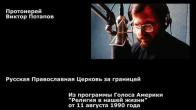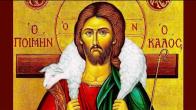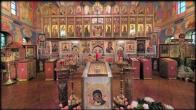ABOUT ORTHODOXY
You are here
Part II. Parables of God's Loving Kindness.
Many of the Gospel parables are easily retained in the memory, especially those that tell of God's loving kindness. At a mere mention of the parables of "The Prodigal Son", "The Good Samaritan", "The Pharisee and the Publican" before us there involuntarily arises the image of the abundantly loving Father, Who from day to day waits for His erring son; the striking image of the Good Samaritan, who aided the man who was half dead from wounds; and at hearing the penitential prayer of the humble sinner-publican, "God, be merciful to me a sinner", the heart is seized by a feeling of compunction and a desire to repeat after this sinner his compassionate prayer over and over for oneself. Who does not know the pictures so full of genius by Rembrandt, Dore and other artists well known throughout the world, who frequently turned to the inspired images of these parables in their creative work.
This once again confirms that in Christ's sermons concrete and striking narratives, drawn from life, are at all times retained firmly and for a long time in the memory by the Saviour's hearers, and the man who tries to understand the meaning of these narratives can ponder over them, delve deeply into their content and gradually grasp the wisdom concealed in them.
The narratives of Jesus Christ that are devoted to God's loving-kindness conventionally constitute the second group of His parables. Spoken by the Lord a few months before his sufferings, they tell not only of God's limitless loving kindness toward repentant sinners, but also of the necessity for Christ's followers to love one another.
The parables of God's loving kindness show us from what it is necessary to withdraw and to what it is needful to cling: [withdraw] from sin [and cling] to repentance in "the embrace of the Heavenly Father". It is necessary to examine these parables in connection with the tragedy of the original sin and its consequences.
The Church teaches that God is all good and omnipotent; but His omnipotence is an omnipotence of love, because God is Love. Therefore, God did not create evil and, one may say, even could not create it.
Evil then, according to the teaching of the Church, appeared only because God created His higher creations man and angels entirely free beings, according to His image and likeness. They can even go not on the path appointed by God.
God is, first of all, Love; and man resembles God, that is, becomes more like Him, when he loves, when he grows in love. But is it possible to love not freely, by necessity or by coercion? Of course not. It is only possible to love freely. Therefore love is the actual implementation, manifestation or realization of freedom.
That is why God also created angels and men free. He created them for Love, in order that they might participate in that blessedness of mutual love in which He Himself, God, Trinal in Persons, abides.
Freedom contains within itself also the risk of incorrect choice, the risk of deviation from the true way, and, unhappily, this incorrect choice was made by certain angels and by the primogenitors of the human race, whence also evil arose.
Protopresbyter Michael Pomazansky, in his "Dogmatic Theology" writes that at the creation, the Creator endowed man with three supreme gifts: freedom, reason and love. All these properties are essential for spiritual growth. But where there is freedom, there is the possibility of wavering in one's choice; temptation is possible. "The temptation for reason is to grow proud in mind; instead of acknowledging the wisdom and goodness of God; to desire oneself to be a 'god'. The temptation for the feeling of love is: in place of love for God and one's neighbor, to love oneself and everything that satisfies the lower desires and gives temporary enjoyment. This possibility of temptation and fall stood before mankind, and the first man did not stand firm against it" [page 154 in the English edition of Orthodox Dogmatic Theology].
Why the incorrect choice occurred with the first people is impossible to explain. Every creation is filled with profound meaning, as something created by the all wise God; and it, as something possessing meaning, is explainable. But evil was not created by God, and therefore it is of itself deprived of meaning; it is nonsense, which is inexplicable.
The power of evil lies only in the consent of a free man's will to it. On earth then, evil can take place only to the extent that the will of men is inclined toward evil, until man freely returns to the one true path of free, loving fulfillment of the all good will of God.
God, of course, foresaw that angels and man could make an incorrect choice; what is more, He knew that the incorrect choice would be made; and He, before eternity (speaking in an overly human manner) "took measures" for the correction of man's mistake. According to His immeasurable love, God responds to all man's mistakes, to all human evil and to all the sufferings of men with Self-sacrifice. He takes all the mistakes, all the evil and all the sufferings upon Himself, as if He, Who is innocent of any evil were the author of evil.
Man turns away from love, leaves the path of love; but God always remains Love and only Love. The meaning that the Lord's sacrifice has for men is that it gives to men the possibility once again to choose freely the correct path. God does not wish, and even "is not able" to save men by force. He always only calls and summons; but in Christ, God summons men to Himself in a completely new way.
Oliver Clement, the French theologian, in an article on evil, published at one time in the 31st number of the journal, Kontakt, writes: "God can do everything, except compel man to love… This paradoxical impotence of God (at the creation of man), Who, of course, still remains omnipotent, already announces to us beforehand the mystery of the Cross… God is so omnipotent that he can suspend His omnipotence…
"There is no need for Christians to create a special theory for justifying God (theodicy). To all the questions regarding the allowance of evil by God (the problem of evil) there is one answer Christ; the Crucified Christ, Who burns up in Himself all the world's sufferings for ever; Christ, Who regenerates our nature and has opened the entry to the Kingdom of everlasting and full life to each one who desires it."
The Church teaches that from the time of Christ's coming into the world, the fullness of Divine Love is revealed to those who believe in Him, the veil has fallen away and in the Lord's sacrifice Divine Love has been laid bare completely, while in His Bright Resurrection the all conquering power of this Love has been revealed.
It only remains for the faithful to taste this Love and partake of it: "O taste and see that the Lord is good", exclaims David the Psalmist.
What is sin?
Sin, according to the expression of one theologian, is "missing the mark". Man was created in order to be a creatural image of God, in order to live in unity with God and to exercise authority over the whole universe. The failure of man in this his task is that sin which is also called "the Fall".
Orthodox tradition usually understands the tasting from the "tree of the knowledge of good and evil" as a real experience of the acceptance of evil by man; but sometimes the Fall is understood (for example, by Saint Gregory the Theologian) as man's attempt to overstep the limits of his capabilities, an attempt to realize that which was not within his power. But, however different interpretations may differ in their details, one thing is completely clear: because of his pride and envy and the absence of humble gratitude to God, man yielded to Satan's temptation and violated God's commandment. Thus, he "missed the mark" of his calling. And having violated God's law, he ruined not only himself, but also the whole universe, which had been entrusted to his care.
In the Bible and in Orthodox theology, sin, evil, the devil, sufferings and death always coexist. Not one of them comes about by itself, and they all are the result of man's revolt against God and the loss of communion with Him: sin gives birth to sin.
The history of the Fall in the Book of Genesis is the Divinely inspired symbolical description of man's primordial potentialities and fall. The capability for eternal growth and development in God that was given to him was used by him for increasing and developing evil, for converting the universe into the devil's principality, into a cosmic cemetery, which groans and is in torment until it will be saved by God. All the children of Adam, that is, all those who belong to the human race, share this tragic fate. Even infants, who are born as images of God in a world originally good, there and then become part of a world bound by death, ruled by the devil and filled with the abominable fruits of the deeds of innumerable generations of his evil servants.
Here it will be appropriate to recall why already in the ancient Church the baptism of infants was established everywhere. A local council in Carthage in 252, under the presidency of Saint Cyprian, enacted the following: "…not to forbid (baptism) to an infant who, having only just been born, has not sinned in anything, except that by being descended from the flesh of Adam he has received the infection of the ancient death through birth itself, and who all the more readily approaches to receive the remission of sins, since not his own, but another's sins, are remitted him."
And so, the consequence of sin is the loss of paradise. Christ tells in the second group of His parables, which are devoted to God's loving-kindness, how a man is to return to his first created state of blessed life in God and restore his spiritual beauty.
©V. Potapov
PARISH LIFE
Address of our Cathedral
Subscribe to our mailing list
While all the materials on this site are copyrighted, you may use them freely as long as you treat them
with respect and provide attribution on the Russian Orthodox Cathedral of St.John the Baptist of Washington DC.









